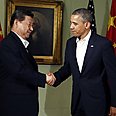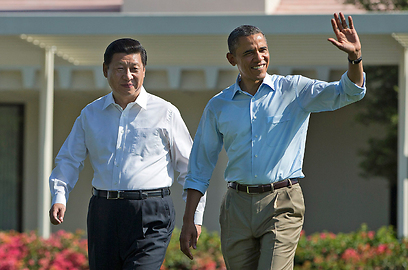
Jinping, Obama
צילום: רויטרס
Obama confronts Xi on cyber theft, affinity found on North Korea
US president meets Chinese president in California, discuss allegations of Chinese cyber attack on US; two agree on reining in North Korea
US President Barack Obama confronted Chinese President Xi Jinping over allegations of cyber theft on Saturday but they agreed at a shirtsleeves summit in the California desert on reining in North Korea.
The two leaders debated how to handle China's growth as a world power more than 40 years after President Richard Nixon's groundbreaking visit to Mao Zedong's Communist China in 1972 ended decades of estrangement between Washington and Beijing.
Related stories:
- US steps up cyberwarfare in Mideast
- Obama, China's Xi seek to ease tensions on cyber security
- North Korean officers join Assad's forces
While Obama publicly emphasized the US desire for a "peaceful rise" by China, privately he laid out some specific examples to Xi of what the United States says is Chinese cyber thievery.
American officials have voiced increasing alarm at cyber spying from China that has hit US businesses and Obama is under pressure to take steps to stop it amid controversy in America about the extent of his own government's counterterrorism surveillance.
Obama, Xi in California (Photo: AP)
The Washington Post reported recently that China had accessed data from nearly 40 Pentagon weapons programs.
Obama's message to Xi carried a warning, "that if it's not addressed, if it continues to be this direct theft of United States property, that this was going to be a very difficult problem in the economic relationship," White House national security adviser Thomas Donilon said.
Chinese State Councillor Yang Jiechi told reporters Beijing wanted cooperation rather than friction with the United States over cybersecurity. Xi had told a news conference with Obama on Friday that China itself was a victim of cyber attacks but that the two sides should work together to develop a common approach.
"Cybersecurity should not become the root cause of mutual suspicion and friction, rather it should be a new bright spot in our cooperation," Yang said.
But while cyber attacks were a sore spot, the two leaders found common ground on North Korea, whose belligerent rhetoric, nuclear tests and missile launches have frustrated its only ally, Beijing, and raised tensions in the Asia Pacific.
American officials came away from the Obama-Xi summit believing that China is ready to work more closely with the United States on North Korea than it has in the past, but offered no specific concrete measures to be taken.
Donilon told reporters that Obama and Xi "agreed that North Korea has to denuclearize, that neither country will accept North Korea as a nuclear-armed state and that we would work together to deepen cooperation and dialogue to achieve denuclearization."
Yang told a separate news conference that Xi had told Obama that China and the United States were "the same in their positions and objectives" on the North Korean nuclear issue.
China still N. Korea ally
In one tangible outcome of the summit, Obama and Xi agreed to cooperate in fighting climate change by cutting the use of hydrofluorocarbons, or HFCs, which are greenhouse gases.
In talks that may set the stage for US-Chinese relations for years to come, both Obama and Xi appeared to gain something from talks that both used to try to advance a new model of cooperation between the world's lone superpower and its rising economic competitor in Asia.
Obama, whose second term has gotten off to a rocky start at home, was able to break away from domestic political troubles and advance US interests in Asia, even as he faces a new controversy over a government-run domestic surveillance program that in recent days has emerged as far more expansive than originally thought.
Xi was able to promote directly to Obama his desire for a "new model of major country relationship," in which China would be viewed as an equal global player.
Many questions remain unanswered about US-Chinese relations in the wake of the talks. Concerns about the US military "pivot" toward Asia were unresolved, while Washington's worries about China's military assertiveness are ongoing.
To that end, Obama urged Xi to de-escalate a contentious territorial dispute with Japan over remote islands in the East China Sea and deal with the matter through diplomatic channels, Donilon said.
A maritime territory dispute over islets in the East China Sea has escalated to the point where China and Japan scramble fighter jets and patrol ships shadow each other.
The United States, a formal security ally of Japan, says it is neutral about sovereignty over the islets, but opposes use of force or unilateral efforts to change the status quo.
For its part, China urged the United States to halt its arm sales to Taiwan.
Aside from the discussion of various disputes, the overall objective of the summit appeared to have been reached, as Obama and Xi simply got to know each other and injected some warmth into often chilly relations.
- Receive Ynetnews updates directly to your desktop











